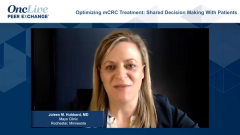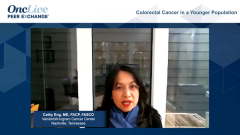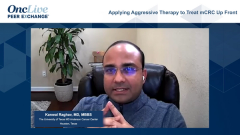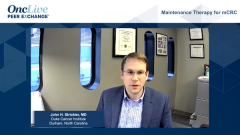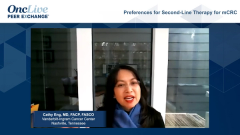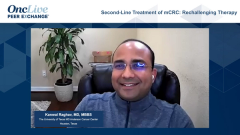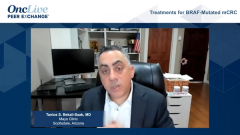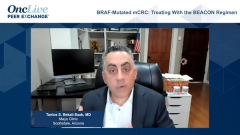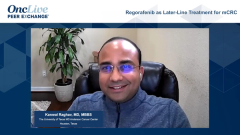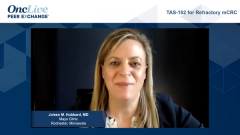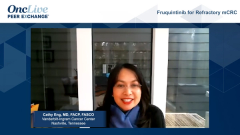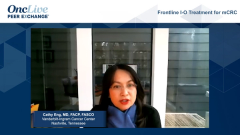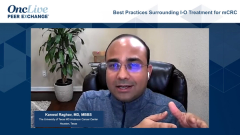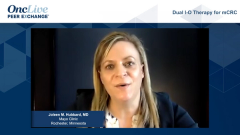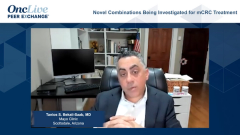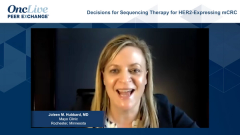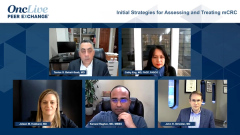
TAS-102 for Refractory mCRC
Variables that impact patient selection for TAS-102 treatment as later-line therapy for metastatic colorectal cancer and considerations for using TAS-102 in combination with bevacizumab.
Episodes in this series

Tanios S. Bekaii-Saab, MD: The other agent that’s available to us is an agent called TAS-102 [tipiracil hydrochloride]. What is TAS-102 [tipiracil hydrochloride], and what do we know about it in colon cancer?
Joleen M. Hubbard, MD: I explain to patients that it’s kind of a souped-up pleura permeating, a combination of 2 drugs that together have been shown to improve overall survival compared with placebo. In terms of the overall survival, benefit from the RECOURSE study was just about 2 months. It’s not dramatic. We’re not seeing much in terms of response rates. But compared with regorafenib, it definitely has a different adverse-effect profile and is an option for third or fourth line for patients.
The recent PRECONNECT study, which looked at the real-world use of regorafenib and TAS-102 [tipiracil hydrochloride], showed that you can use TAS-102 [tipiracil hydrochloride] at any point in the patient’s disease. Before or after regorafenib, it still has the same degree of efficacy. For the decision to choose TAS-102 [tipiracil hydrochloride] vs regorafenib, when you’re at the third-line setting, look at what’s going on with the patient. Is the patient already having adverse effects? For example, not being able to eat much and the performance status isn’t as great. That’s a situation in which TAS-102 [tipiracil hydrochloride] may be an optimal choice for a patient, vs did the patient have chronic problems with blood counts because they’ve had chemotherapy off and on for 2 years. One of the most common things with TAS-102 [tipiracil hydrochloride] is actually neutropenia. Maybe in that situation, regorafenib may be better. Start with that in third line, then reserve TAS-102 [tipiracil hydrochloride] for the fourth line. It’s another option, but it’s not going to cause great response rates. Survival benefit is out of order of a couple months but definitely an option for patients who are fit and want to go for more therapy.
Tanios Bekaii-Saab, MD: Do you add the ravulizumab to TAS-102 [tipiracil hydrochloride]? There were intriguing data presented and then practically published that suggest the addition of ravulizumab to TAS-102 [tipiracil hydrochloride] may fare better than TAS-102 [tipiracil hydrochloride]. It’s a phase 2 randomized study. The delta was interesting. Data were also presented recently of TAS-102 [tipiracil hydrochloride] and ravulizumab, favoring TAS-102 [tipiracil hydrochloride]. Any thoughts?
Kanwal Raghav, MD, MBBS: I have not made a change. Partly because if you look at a couple of the studies that have been done with that combination, you’ll notice that the effect size keeps decreasing as you enrich your population for patients who are heavily pretreated with anti-VEGF agents. Most patients in the United States have a long history of anti-VEGF agents.
That is the same principle you see when you look at VEGF continuation on the second line with aflibercept, ramucirumab, and bevacizumab. You can see as the trial allowed prior bevacizumab vs not, you found that those affect size decrease. I have not used that, and I don’t know how to choose between 1 of those 2 drugs. Their response rates and survival outcomes are very similar.
I usually use regorafenib before I use TAS-102 [tipiracil hydrochloride], but that is because there are some data for TAS activity in regorafenib preperiod, whereas vice versa there are no data. Most of my patients have come in off chemotherapy, and there have been patients who tolerated FOLFOXIRI [5-fluorouracil, leucovorin, oxaliplatin, irinotecan] well. I give them TAS-102 [tipiracil hydrochloride], then they require transfusions. It’s not as easy a drug to tolerate, though granted its toxicities are completely different. Bottom line is that I’m not really using it regularly for most patients.
Transcript Edited for Clarity


